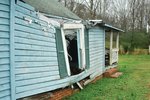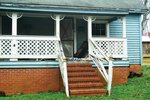




SILER CITY — Dennis Pinnix tells the story of communicating with a local resident about the number of ways that resident was violating city codes on his property.
The exchanges, by phone and by mail, seemed to fall on deaf ears.
Finally, Pinnix — who owns State Code Enforcement Inc., the company Siler City employs for its code enforcement work — decided to visit the man at his home.
The homeowner told Pinnix: “I own this. I want to do what I want to do with it.”
No so fast, Pinnix told him.
“And I told him I agree with him, except when it affects someone else’s life or property values,” he said.
Pinnix asked the man, “What if I purchased the land next to yours and opened a hog farm? Would that affect you?”
A point the man understood quickly.
“That’s why we have ordinances,” Pinnix said. “To protect everyone’s way of life and property values.”
Since last May, Siler City has contracted with State Code Enforcement Inc. to handle the sometimes dirty, sometimes difficult work of enforcing local ordinances — a job which entails, among many other things, making sure homeowners and business owners address high grass, weeds, junk piles and other nuisances on their property, as well as enforcing minimal housing codes for builders and landlords.
Siler City is one of 10 municipalities where SCEI works. George McDuffie, the company’s code enforcement officer handling Siler City, has an office adjacent to Siler City Town Planner Jack Meadow’s office in town hall and has been hard at work since last May doing that work. In that time, he’s logged 547 investigations, a “great volume of work,” according to Meadows.
For decades, the town’s inspections and code enforcement were all conducted in-house. Charlie McLaurin was the chief inspector and Sergio Borrayo had split duties as an inspector and as a code enforcement officer. When McLaurin retired a year ago, the town contracted with Chatham County to perform its new inspections, while Borrayo continued split duties handling inspections for permits that were already in process.
But as those projects starting coming to a close, Borrayo —who held numerous certifications for inspections — began to look elsewhere for a job because maintaining those certifications required actually conducting inspections. Early last year, Borrayo took a job with Chatham County, leaving a void in code enforcement in town.
Meadows, in conjunction with then-town manager Bryan Thompson, suggested the town contract out ordinance enforcement services for a time to “test the waters.” That led the town to SCEI, a relationship which seems to be fruitful. For $99,840 a year, the town gets a designated code enforcement professional from State Code Enforcement, but also benefits from the company’s experience, software and administration.
SCEI owner Pinnix is a retired Greensboro firefighter. Pinnix says he had a “passion for working with people” and felt that he could help “educate people on codes and ordinances.” In 2012, his company assisted Ed Brown with ordinance enforcement in Asheboro. Since that time, SCEI has expanded and serves the communities of Elon, Mooresville, Roxboro and others.
“[Pinnix] brings many years of experience and knowledge from working with other communities,” Meadows said. “We’ve gained all that.”
“With our certifications, knowledge, experience and approach to code enforcement we bring a great value to a town or city,” Pinnix said. “We save the towns and cities from having to go through the hiring process, training the new officer, purchasing a vehicle, maintenance for the vehicle, insurance, uniforms and benefits for the new employee.”
Often when a town hires a code enforcement officer, they are “usually green and learn on the job,” Meadows said. But he notes that in this case Pinnix’s company had “educated” them on the best and latest industry practices, bringing code enforcement software that helps track complaints and creating reports and a mapping program that provides a geographical representation of the work that’s being done. Each week, McDuffie and Meadows review ongoing potential violations on a map to ensure that ordinance enforcement is occurring equitably throughout all of the town’s limits.
Pinnix says he tries to work with each of the towns’ citizens to find out what it is they want to do and how it can be done within the town’s ordinances. Meadows notes that SCEI brought concerns about the town’s ordinance to him that were in turn brought to the town’s planning board, a group of town residents who review ordinances and possible recommendations for changes to the town’s board of commissioners.
“In the first months of this new relationship, we learned things and found a few hiccups,” Meadows said. “But with working with both the planning board and the board of commissioners and the contractor, we’ve been able to quickly do things to make it more efficient and economical.”
When the company started working with the town, Pinnix and Meadows worked together to create a priority list of what the town board was seeking from ordinance enforcement. The first priority was in health and safety and included addressing tall vegetation, breeding grounds for mosquitoes, rats, snakes and other vermin, junk piles and abandoned cars. The second priority was enforcing the town’s minimum housing code, so homes that are abandoned or are deemed unsafe for residents and surrounding neighbors.
The investigations start one of two ways — by complaint or by something McDuffie notices while canvassing the town. A significant majority of the investigations, 411, were identified by McDuffie during his “proactive” canvasses. A majority of those violations were for high grass, junk piles or other “nuisances.” This winter, McDuffie moved his focus to identifying homes which violated the minimum housing code. To date, McDuffie has logged 92 investigations of properties based on those codes.
The town’s minimum housing code is based directly on state statute, according to Pinnix. Pinnix notes there are several classifications for “minimum housing.” For example, minimum housing requires a landlord supply heat for a renter which must be adequate based on the state standard. If there is not heat in every habitable room, the building is considered uninhabitable. In those cases, Pinnix’s company serves as a mediator between the property owners and the tenants to ensure the rental is safe and meets minimum housing standards.
Other classifications involve structural deficiencies such as those with broken windows, bad roofs and collapsing walls, where the safety of residents of and around the building are in danger because of its condition. Pinnix notes this is especially of concern for abandoned and dilapidated homes where neighborhood children could get hurt.
The minimum housing code not only defines what minimum housing is, but also sets out a step-by-step procedure for how a municipality can address it — whether it’s repaired or eventually demolished. Pinnix says his company tries to work with landowners first. If progress on repairs are being made, he will work with the person, but if not, they follow those procedures.
Of the investigations initiated by McDuffie, 445 have been resolved, though most of those were for grass, debris and nuisance violations. McDuffie and Meadows have been working on the minimum housing violations list in order to work with the board of commissioners to determine the best way forward in those instances. The list of nearly 100 homes are rated based on severity of the violation and condition of the property. Resolving the violations on those buildings, many of which are abandoned, will likely take a greater investment by the town.
Previously, McLaurin and Borrayo were able to resolve two of these types of cases a year, typically resulting in demolition. The process to demolish personal property is a protracted one and comes with costs. The board will likely consider what type of investment it is willing to make during the upcoming budget development sessions.
If you have questions or wish to file an ordinance complaint, call McDuffie at 336-553-9696 ext. 404.
Reporter Casey Mann can be reached at CaseyMann@Chathamnr.com.